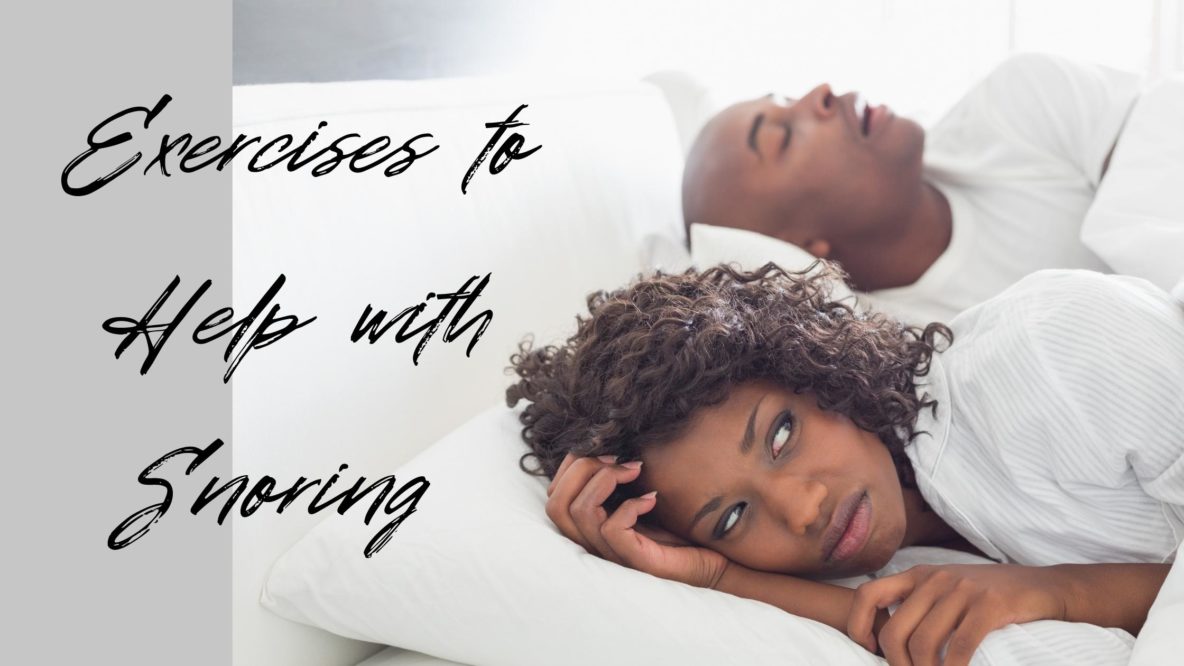Exercises to Help with Snoring

- A Promising Paradigm Shift: New Research Challenges the CPAP-First Approach to OSA Treatment - September 5, 2023
- Understanding Sleep Meditation Techniques - July 30, 2021
- How Online Learning Has Affected Sleep for Students - July 13, 2021
Do you snore every night? Is your partner complaining that your snores are keeping them up at night? Maybe your snores are disrupting your sleep, waking you up in the night, or causing daytime fatigue.
There are a few ways you can reduce snoring, and sleep more peacefully at night. Some throat and mouth exercises can even alleviate mild obstructive sleep apnea. By strengthening the muscles in the throat and mouth, you may be able to reduce the strength and frequency of snores. Here are some of our favorite exercises that can help with snoring.
How do Exercises Help with Snoring?
Snoring and sleep apnea are often caused by very relaxed muscles in the throat and mouth. When these muscles are too relaxed, they can block the airway. Muscles in the neck, throat, tongue, or mouth cause an obstruction and contribute to snoring.
Exercises can tone these muscles. In the same way that you tone your arm or leg muscles, exercising muscles in the throat and mouth can strengthen these muscles. Over time, the muscles are less likely to relax, and these exercises can stop the tissue in your throat or mouth from becoming floppy or fluttering during sleep.
It’s recommended that you do these exercises for 5 to 10 minutes every day. It may take 2 to 3 months to see changes in snoring. You would never expect to see immediate results when you first start going to the gym, and you’ll need to think of these exercises in the same way. Exercises can help you sustainably reduce snoring in the long run. It’s also recommended to consult with a sleep specialist to find out more about these exercises, and learn other ways you can reduce snoring.
Exercises to Help with Snoring
Facial Exercises
Mouth and facial exercises can strengthen the muscles in your face and help reduce snoring.
Cheek hook: This exercise helps keep your mouth closed during sleep.
- Use a finger to pull your cheek outward, then use your facial muscles to pull your cheek inward. Repeat several times on each side.
Tightly closing mouth: This tones your jaw and throat muscles.
- Close your mouth tightly and purse your lips, then open your mouth to relax the muscles. Repeat several times.
Tongue Exercises
Tongue exercises can improve tongue positioning during sleep, and prevent the tongue from blocking your airway.
Tongue slide:
- Start with your tongue at the roof of your mouth behind your top teeth. Gently slide your tongue backward while keeping the tip of the tongue on the roof of your mouth. Repeat several times.
Tongue Stretch:
- Stretch out your tongue as far as it will go. Stretch it down towards your chin. Hold for a few seconds then release. Repeat several times.
Breathing Exercises
Breathing exercises can strengthen your muscles and help keep your mouth closed during sleep. Breathing through your nose can prevent snoring.
Single nostril breathing:
- Inhale deeply through your nose. Then with a finger close one nostril and exhale slowly through the other nostril.
- Remove your finger and inhale deeply. Close the other nostril and exhale slowly through the open nostril. Repeat several times.
Vocal Exercises
Vocal exercises can strengthen your vocal cords as well as neck and throat muscles.
Saying vowels: This tones the muscles in your throat.
- Say the vowel sounds a-e-i-o-u slowly and deliberately.
- Start to stretch out the sounds and say them very slowly.
- Next, say the sounds very rapidly.
- You can repeat each vowel several times in a row, or try them in different combinations.
Singing: When you sing, many muscles in the mouth, throat, and neck are active.
- Singing daily, and stretching your range to sing lower and higher sounds can reduce snoring at night. When you sing, focus on clearly pronouncing each sound to strengthen and tone your muscles.
Sound Sleep Medical
Try these exercises, then visit us at Sound Sleep Medical for more tips to reduce snoring. We may suggest a different sleeping position or pillow, or incorporate changes in your sleep hygiene. We’ll also find out if you have sleep apnea that could be causing your nighttime snoring and your daytime fatigue. If you’re having difficulty sleeping at night, visit us today to get back to sleep.
